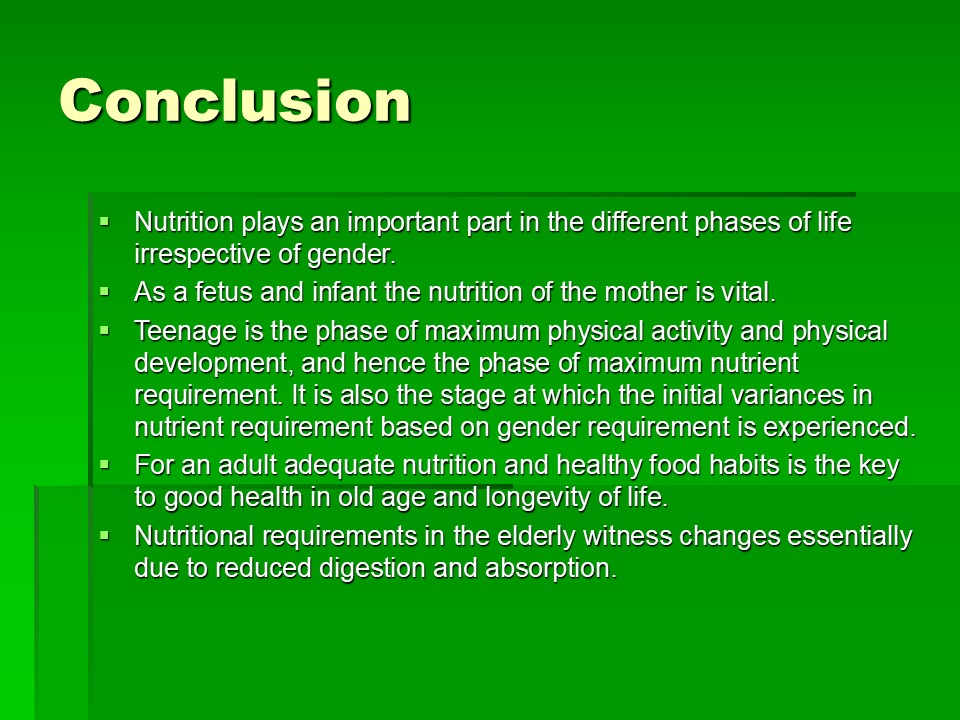Nutrition for Infants
- No difference in nutritional requirement for male and female infants.
- Adequate nutrition crucial to growth and development of infant.
- Breast milk and infant formula feed meet the nutritional requirement of infants.
- After 3 to 4 months gradual augmentation with mashed fruit and fruit juices.
In infants growth and development of the brain and body takes place. Adequate nutrition is essential to this growth and development. There are differences in nutritional requirements between males and females at this stage of growth and development. Infants are dependant on breast milk or infant formula feed for their nutritional requirement. Breast milk is the better means to infant nutrition, as besides providing the total nutritional requirement, it provides the benefit of giving the infant increased resistance to infection. In addition it is easy on the developing digestion system of the infant. After three to four months breast milk alone becomes insufficient to meet the nutritional needs of the infant. Augmenting mothers milk with mashed fruit and diluted fruit juices becomes necessary. Later on mashed cereals can be added to the nutrient provided to the infant. (Nutritional Needs of Infants).
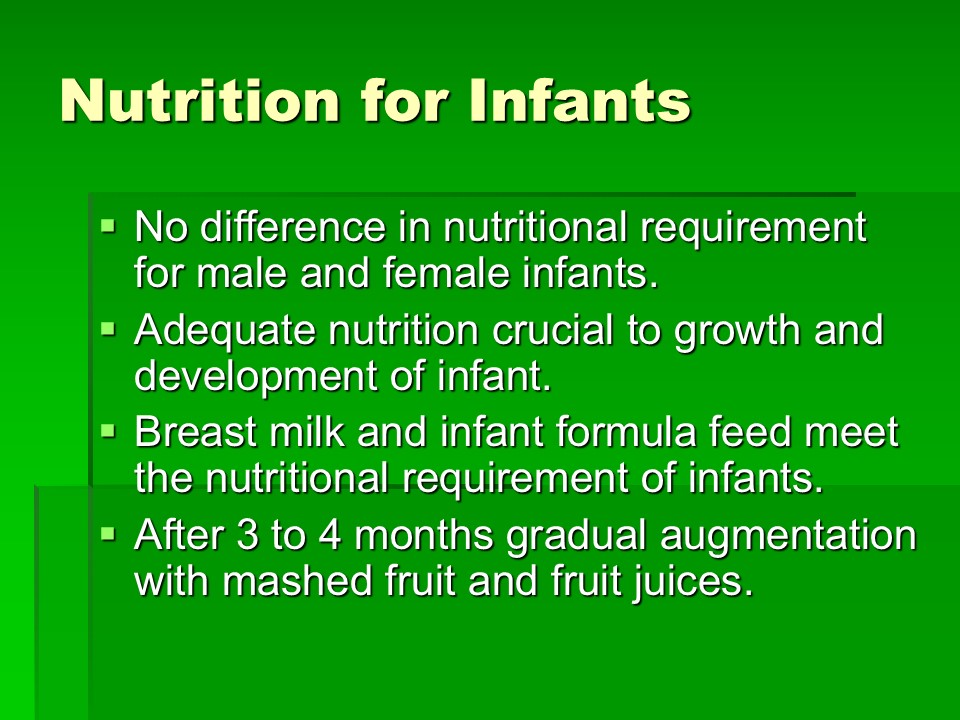
Nutrition for Teenager (Males & Females)
- Increased requirement of carbohydrates, proteins, fats, and vitamins to meet nutrient requirements of most vigorous phase of growth and increased energy requirements.
- Total protein requirement more in males than in females.
- Increased calcium requirement to for healthy growth and mass of bone.
- Increased protein synthesis results in increased requirement of zinc.
- Increased requirement of carbohydrates, proteins, fats, and vitamins to meet nutrient requirements of most vigorous phase of growth and increased energy requirements.
- Iron supplementation is required more for females.
- Increased calcium requirement to for healthy growth and mass of bone.
- Increased protein synthesis results in increased requirement of zinc.
During teenage the demands of energy and nutrient are at the highest than any phase in life irrespective of gender. This results from the physical changes and physical activity associated with stage of life. Physical activities of boys is normally more than that of teenage girls and hence there is an increased requirement of calorie intake by boys at this stage. Per kilogram requirement of protein is the same for both boys and girls, but with boys having normally more bodyweight than girls, total protein requirement is greater than in girls. The onset of menstruation in teenage girls leads to loss of iron and hence iron requirement in teenage girls is more than that of boys. Increase in iron supplementation in teenage girls also calls for increased folic acid supplementation. Increase in bone length and bone mass in both teenage boys and girls increases the demand for calcium, vitamin D, Vitamin C and Vitamin B12. There is an increased requirement for the micronutrient zinc in both teenage boys and girls, owing to the increased protein synthesis occurring at this stage of life. However, boys tend to put on more muscles and have more protein synthesis, and hence boys tend to require more zinc, vitamin A, Vitamin E, and some of the B vitamins. (What are the different nutritional needs for male and female teenagers).
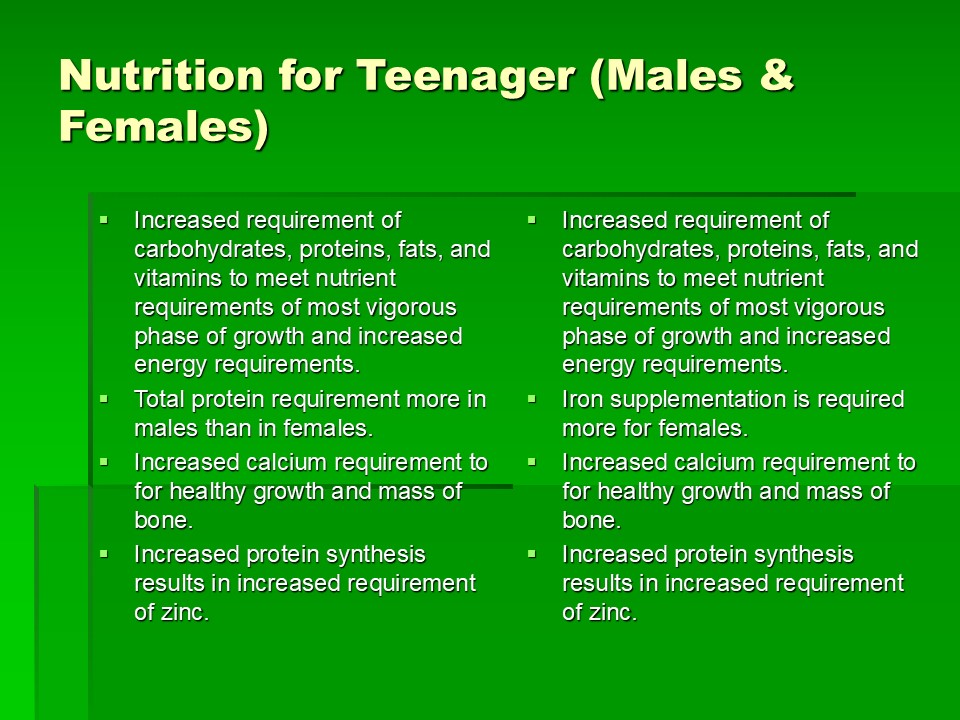
Nutrition for Adults (Males & Females)
- Healthy food habits as an adult has a positive impact on health in old age and longevity of life.
- Calorie intake needs to match energy output. In adult males physical activity tends higher than females and calorie intake may be higher.
- Adequate levels of protein, vitamins, minerals and other micronutrients is necessary.
- Consumption of alcohol, if any, should be moderate.
- Healthy food habits as an adult has a positive impact on health in old age and longevity of life.
- Calorie intake needs to match energy output. In adult males physical activity tends higher than females and calorie intake may be higher.
- Adequate levels of protein, vitamins, minerals and other micronutrients is necessary.
- Consumption of alcohol, if any, should be moderate.
Maintaining good food habits and a healthy life style as an adult is the key to better health in old age and longevity of life. As an adult the intake of calories needs to be match the energy requirements. Greater calorie intake can lead to obesity and the onset of lifestyle diseases of diabetes and ischemic conditions that have a negative impact on the health of an individual and the possible length of life of the individual. Adequate levels of proteins, minerals and micronutrients need to be maintained to ensure the healthy condition of the body and prevent or delay the onset of diseases that may have hereditary origins. As part of maintaining healthy food habits consumption of alcohol needs to b e in moderation. Women need to continue the increased intake of iron and folic acid to offset the loss of iron during menstruation. (Nutrition For Adolescents, Adults and the Elderly).

Nutrition During Pregnancy
- Nutrition during pregnancy plays a critical role on the health of both mother and child.
- Nutrition requirement during pregnancy is increased due to the development of the fetus and the vulnerability of the fetus to poor nutrition.
- The increased nutritional requirements include increase in calorie, protein, vitamins, minerals, and fluids.
- Increase in nutritional intake leads to weight gain and adequate weight is essential in a pregnant woman.
- Substances that are damaging to the fetus should not be consumed.
Nutrition during pregnancy has a vital role to play in the development of the fetus leading to a healthy child. The nutritional needs of a pregnant woman are n o longer nutritional needs of her own body, but also the nutritional needs of the new life developing in her womb. The food that a pregnant woman consumes is not just vital to her health, but to the health of the child in her womb. It is natural that nutritional requirements of all the vital components of nutrition like carbohydrates, proteins, vitamins, minerals and fluids increase and there should be an adequate increase in the intake of these nutrients. A pregnant woman will put on weight with the increase in nutrients consumed. Adequate weight gain is a positive sign in a pregnant woman and the pregnant woman should not get alarmed and cut down her nutrition intake to reduce this adequate weight gain. What an pregnant woman consumes could affect a fetus and the pregnant woman needs to ascertain that the food that she consumes does not contain substances toxic to the fetus. An example of this is that in an attempt to increase protein intake, the pregnant woman may eat a lot of fish that is contaminated by methyl mercury, which at high levels could damage the fetus. Choice of nutrition that does damage the fetus is an integral part of healthy nutrition during pregnancy. (Nutrition, Pregnancy and Infants).
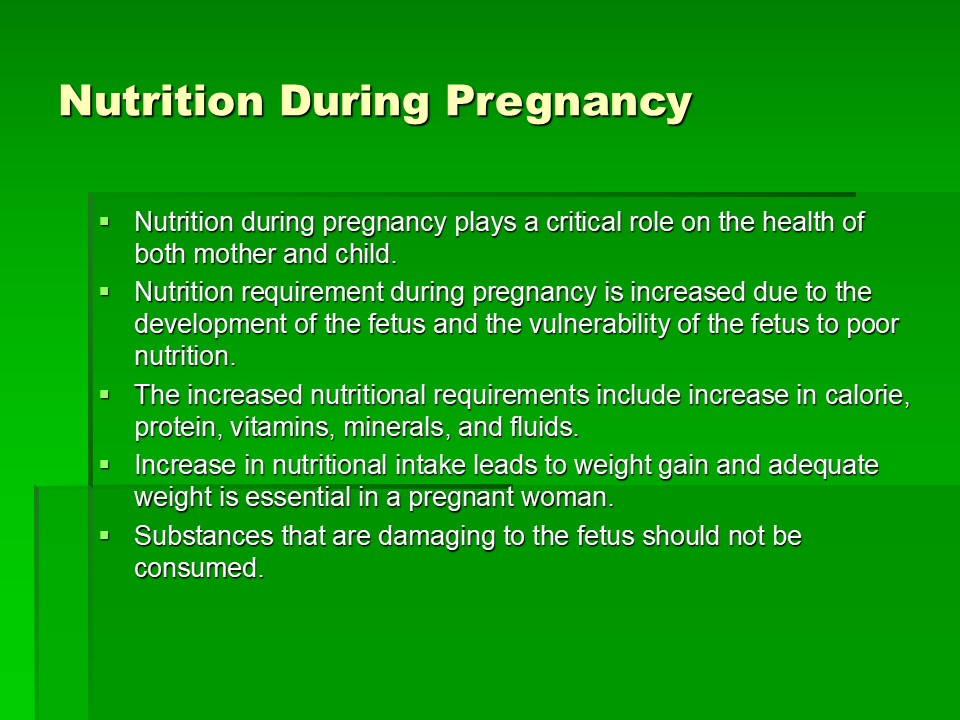
Nutrition for the Elderly (Males & Females)
- Nutritional intake must be adequate to maintain stable body weight.
- Adequate intake of carbohydrates and fats to continue, with an increase in protein intake.
- Fluid intake to be maintained.
- Increase in intake of calcium, vitamin B12, and vitamin D.
- Diet high in antioxidants to reduce susceptibility to disease.
- Nutritional intake must be adequate to maintain stable body weight.
- Adequate intake of carbohydrates and fats to continue, with an increase in protein intake.
- Fluid intake to be maintained.
- Increase in intake of calcium, vitamin B12, and vitamin D, particularly in women.
- Diet high in antioxidants to reduce susceptibility to disease.
Maintaining a stable body weight is a sign of good health in the elderly. Loss of weight has a negative impact on the ability of the elderly to resist disease. To maintain stable body weight adequate intake of carbohydrates and fats needs to be continued, with an slight increase in proteins. The nutritional focus in this aspect is to increase nutrient density and not energy value, as there is a decrease in energy expenditure in the elderly and reduced capacity for nutrient absorption. Saturated fats, trans fats, and foods rich in cholesterol need to be avoided. High fiber and fluid intake is advisable for the elderly, as it reduces constipation and the possibility of dehydration. Absorption of calcium and Vitamin B12 are reduced in the elderly and can lead to reduction in bone mass and possibility of osteoporosis. This is more so in women, where normal hormonal changes due to menopause, leads to increase in loss of calcium from the bone. The is decreased synthesis of vitamin D in the skin of the elderly. These factors cause the need for an increased intake of calcium, vitamin B12, and vitamin D in the elderly. A diet rich in antioxidants is useful for the elderly as it helps to ward off diseases that occur due to oxidative damage like visual disorders, and reduce the risk for heart diseases and some cancers. (Nutrition from 2 to 102).
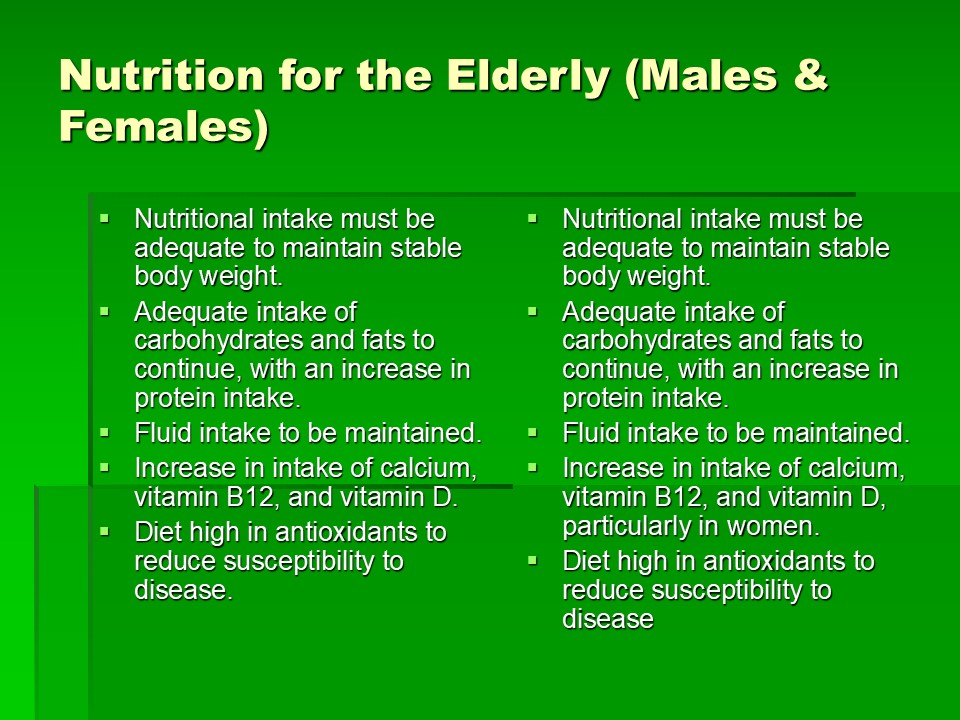
Conclusion
- Nutrition plays an important part in the different phases of life irrespective of gender.
- As a fetus and infant the nutrition of the mother is vital.
- Teenage is the phase of maximum physical activity and physical development, and hence the phase of maximum nutrient requirement. It is also the stage at which the initial variances in nutrient requirement based on gender requirement is experienced.
- For an adult adequate nutrition and healthy food habits is the key to good health in old age and longevity of life.
- Nutritional requirements in the elderly witness changes essentially due to reduced digestion and absorption.
